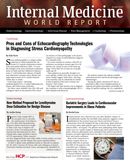Efficacy of New Treatment Methods for AECOPD
For patients with acute exacerbation of chronic obstructive pulmonary disease (AECOPD), the right treatment can make a world of difference in the management of their condition. A recent study looked at how effective inhaled budesonide and systemic methylprednisolone can be for those patients.

or patients with acute exacerbation of chronic obstructive pulmonary disease (AECOPD), the right treatment can make a world of difference in the management of their condition. A recent study looked at how effective inhaled budesonide and systemic methylprednisolone can be for those patients.
The study, published in Pulmonary Pharmacology & Therapeutics observed the medication from a variety of angles using a group of 30 AECOPD patients. The patient pool was split into 2 groups with one receiving 3mg Bid of inhaled budesonide and one group receiving methylprednisolone (methylprednisolone acetate injectable suspension 40 mg QD for 3 days followed by methylprednisolone tables 8 mg Bid).
All the patients met the “GOLD diagnostic criteria and were at least 50-years-old, had at least 20 pack years of smoking history and a diagnosis of AECOPD prior to the trial beginning, according to the study. They were excluded from the group if they had other conditions including asthma, cystic fibrosis, or allergic rhinitis, among others.
As the patients received their treatment, they were monitored for lung function, blood gas, and any adverse events. The researchers also took blood samples at days one, 4, and 7, testing for various readings. While the patients experienced what the researchers termed “significantly improved,” results with both medications they also noted there was “no significant differences between the two groups (P>.05).
“Besides, the levels of HDAC2 protein expression before treatment were significantly lower comparing to that after treatment for 4 and 7 days,” the authors noted. “Incidence of adverse events (heart rate, blood pressure, glycemic, sleep condition, gastrointestinal symptoms) in budesonide group was lower than methylprednisolone group (P < 0.05)
The authors said that the results from the study showed that the treatments could prove beneficial in helping patients with the condition.
“Our results suggest that ICS could be an important therapy and an alternative to systemic corticosteroids for the treatment of AECOPD,” they said. They also noted more study was needed to examine how effective the treatment could be in the long term.
The study was funded by a grant from the National Nature Science Foundation of China.
